The one-winged angel capable of making us dance like crazy: for Music & Videogames, the one and only Nobuo Uematsu takes to our stage
We promised it, and our special this week takes us to one of the biggest names in video game music: the legendary Nobuo Uematsu. Contrary to other authors such as Akira Yamaoka, David Wise, Motoi Sakuraba, Josh Mancell, Grant Kirkhope and (to a certainly lesser extent) Yoko Shimomura, with Uematsu we have an artist more comparable to Koji Kondo for his mainstream notoriety. In fact, this composer will hardly be familiar to you just hearing his name, but if this were not the case we cannot blame you: he wasn’t there. Final Fantasy in Abiura di me, after all.
One last dream
Born on March 21, 1959 in Kochi, Japan, in the prefecture of the same name, Nobuo Uematsu began to devote himself to music between the ages of eleven and twelve: practically, at the same age in which we had begun to enjoy video games, the author was already planting the seeds of his career before they were even born. Like so many artists we’ve talked about in this column by now, Uematsu has mostly studied from self-taught; also thanks to the older sister, former pianist. After graduating in English from theKanagawa university, worked as a keyboard player in some bands and composed music for commercials.
While working for a music shop in Tokyo, Uematsu received a request in 1985 from an employee of Squaresoft, then “unmarried” before the marriage with Enix. While accepting, at the time for him it was just one more chore and nothing else. At the time, the place where he thought he was going to make a career was just that business where records were rented, and certainly not a company that dealt with the then emerging videogame market. If only Uematsu had had a vague idea of the medium of which he would have become one of the leading composers …

And square it was – Music & Video Games: Nobuo Uematsu
A year later, with the collaboration of Takashi Uno, a young Nobuo Uematsu saw one of the first video games (or rather, the first ever) to boast his music come out on the shelves: Cruise Chaser Mansion. He later met the creator of Final Fantasy, Hironobu Sakaguchi. The latter asked the musician to compose for some of his plays, and the author gladly accepted. However, the failure of King’s Knight, 3-D Worldrunner and Rad Racer put Squaresoft in unpredictable financial straits, so Sakaguchi decided to play it all.
Sakaguchi says of himself: “I don’t have what it takes to create an action game, I am better off telling stories”. So, on the trend already established by the then rival Enix with Dragon Quest, Sakaguchi’s last chance was what, in case of bankruptcy, the game would have been. finale: a title fantasy. We all know how “final” this fantasy was: Uematsu’s popularity as a composer has skyrocketed along with that of the Final Fantasy music he has set, both as a “soloist” and in various choral projects in collaboration with other great talented authors.
The Neverending Story – Music & Video Games: Nobuo Uematsu
The first title in the SaGa series, released in the West as Final Fantasy Legend, was one of the first video games outside the main series to boast the music of Nobuo Uematsu. For the second chapter we find Kenji Ito (Chocobo Racing) to assist him. At the end of 1994, he concluded the soundtrack of Chrono Trigger, replacing Yasunori Mitsuda due to the latter’s ulcer. In 1996, he worked on the soundtrack of Front Mission: Gun Hazard and composed that of DynamiTracer independently. He also composed for three of the games in the series Hanjuku Hero.
They are not just games those that Uematsu dealt with. His is the main theme for Oh, my goddess! – The Movie (2000), as well as part of the soundtrack of the 2001 anime adaptation Final Fantasy Unlimited collaborating with Shiro Hamaguchi. As for actual albums, he created his own album in 1994 Phantasmagoria. Inspiration failed in the following years, given the need for assistance from Masashi Hamauzu and Junya Nakano for the soundtrack of Final Fantasy X in 2001. This was the first Final Fantasy of the main series not to come entirely to music by Uematsu.

Rise of the Black Magicians – Music & Video Games: Nobuo Uematsu
Unfortunately, the music of the tenth chapter represents a sad record for video games that boast the style of Nobuo Uematsu. Not surprisingly, in 2002 Naoshi Mizuta gave him a hand for Final Fantasy XI, along with Kumi Tanioka. Only eleven of the songs enjoy input from the legendary composer. In 2002, however, colleagues Kenichiro Fukui and Tsuyoshi Sekito asked him to form a rock band which aimed to reinterpret and expand Uematsu’s work. And, at least initially, Uematsu also refused the offer … before changing his mind on the fly, of course.
The condition that prompted him to accept, in fact, was an informal role as a keyboard player in a live performance. The success of the concert by Uematsu, Fukui and Sekito made the composer change his mind about his initial choice, but the newborn band lacked a name. A colleague at Square, now merged with Enix, suggested drawing heavily on the Final Fantasy that made the artist famous: the first. And it is from the class of the black magician that the fledgling band of instrumental rock, hard rock, progressive metal and symphonic rock would have treated the current name: The Black Mages. In 2003 the band included Keiji Kawamori, Arata Hanyuda and Michio Okamiya, releasing three albums and playing in many concerts.

I would go – Music & Video Games: Nobuo Uematsu
As you may have guessed, in 2004 Nobuo Uematsu embarked on a career from freelancer, primarily founding his own video game production house, Smile Please, and later the record company Dog Ear Records in 2006 for music only. The reason for the breakup was very simple: Square moved to Shinjuku, Tokyo and was finding it uncomfortable with the new location. Moreover, according to him, he had now reached an age where he should have taken life in hand. Not that his freelance role, like Yoko Shimomura, prevented him from collaborating with Square-Enix.
One example was the computer graphics film Final Fantasy VII: Advent Children. He was also offered a composer role for Final Fantasy XII (2006), but the passing of the baton to Hitoshi Sakimoto relegated Uematsu to just the main theme. Similarly, Hamauzu replaced him for the Final Fantasy XIII soundtrack, while the artist’s return to the franchise that consecrated him to the videogame music Olympus was only with Final Fantasy XIV. In addition, Uematsu continues to collaborate with Hironobu Sakaguchi through the latter’s separate company, Mistwalker.

And in the end Smash always has to do with it – Music & Video Games: Nobuo Uematsu
Among the video games for which Nobuo Uematsu has composed music, we also remember Blue Dragon in 2006, Lost Odyssey in 2007, Away: Shuffle Dungeon in 2008, the synonym of Final Fantasy The Last Story in 2011 and Terra Battle in 2014. Even a canceled title, Cry On, was graced by the musical genius of Uematsu. The main theme of Super Smash Bros. Brawl it is also his work: Masahiro Sakurai edited the Latin text instead. Among his extra-videogame contributions we find the anime Guin Saga and e-books, such as Blik 0-1946 which includes his music as an accompaniment.
The British recognition of the Classic FM Hall of Fame, twenty times. In 2012, the Aerith theme since Final Fantasy VII he finished sixteenth, a first for any videogame composition. Thanks to the votes of the fans, this feat was repeated in 2013, 2014, 2015 and also in 2016. However, recently Uematsu has also started to struggle for what we hope to be simply the first ailments due to age. .
Health first – Music & Video Games: Nobuo Uematsu
In September 2018, Nobuo Uematsu took a break from live music due to a disease, which he has not yet made known, also affecting his work with video games. In fact, in 2020, the only contribution to the Final Fantasy VII Remake soundtrack was the main theme. As for his future projects in our medium, however, it seems that the curtain will fall soon. Just this year, Hironobu Sakaguchi said the imminent Fantasian it may even be the latest game to boast the musical talent of one of the industry’s greatest artists.
In the private life to which he retired, Uematsu lives in Tokyo with his wife Reiko, met at the university, and with her beagle Fell. Occasionally in the summer he moves to his second home in Yamanakako. Among his hobbies, Uematsu includes good beer, cycling and wrestling. The latter was also one of his dreams: as a young Uematsu he would have wanted to become a professional wrestler, but luckily for us and our ears he preferred music. And speaking of it, perhaps we should say a few words about …

Concerts – Music & Video Games: Nobuo Uematsu
There is truly an avalanche of things to say about Nobuo Uematsu’s live music, and with all the video games he has worked on we should pick up the pace. Outside of Japan, Final Fantasy’s music stage debut was at Symphonic Game Music Concert of 2003 in Leipzig, Germany. Other homonymous concerts were held in the following three years. The unreleased arrangement of Those Who Fight from Final Fantasy VII (the regular battle theme) from 2003 was played by pianist Seiji Honda, along with Dancing Mad from Final Fantasy VI (final clash) and Distant Worlds from Final Fantasy XI (featuring the voice of soprano Izumi Masuda).
After the Japanese tour Tour de Japon it was the turn, on May 10, 2004, of Dear Friends: Music from Final Fantasy at the Walt Disney Concert Hall in Los Angeles, California, with Miguel Harth-Bedoya (Fort Worth Symphony Orchestra) conducting the Los Angeles Philharmonic Orchestra. The concert’s popularity sparked a US tour, as well as a sequel titled More Friends: Music from Final Fantasy at the Gibson Amphitheater on May 16, 2005, with the Grammy winner Arnie Roth to lead. On his last day as an employee, Square made an appearance at the A Night in Fantasia concert in October 2004.
Ten, one hundred, one thousand voices – Music & Video Games: Nobuo Uematsu
The concert Voices: Music from Final Fantasy on February 18, 2006 at the Pacifico Yokohama convention center he filled the music of Nobuo Uematsu with voices. Among the guest stars we have the singers Emiko Shiratori, Rikki, the aforementioned Izumi Masuda and Angela Aki. To lead we …















Leave a Reply
View Comments